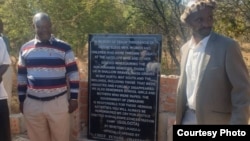The National Transitional Justice Working Group (NTJWG) has expressed concern over a plaque which was unveiled at the Bhalagwe mass grave site in Kezi, Matabeleland South, was stolen by suspected state security agents last week.
In a statement, the group said it stands with the people of Kezi, Ibhetshu Likazulu and other victims of Gukurahundi in “condemning this act and calls on all Zimbabweans to take a stand against the destruction of memorial sites and structures.
“The NTJWG specifically calls upon the National Peace and Reconciliation Commission (NPRC) to launch an investigation into the destruction of the plaque and hold the perpetrators of this callous act accountable. Furthermore, the NTJWG implores the NPRC to provide the people of Kezi with counselling services and any other necessary support as this incident has likely re-traumatized them.”
The unveiling of the plague was done during a memorial service held in memory of all the people, who lost their lives during the Gukurahundi era. Over 20,000 people were killed by the Fifth Brigade, according to the Catholic Commission for Peace and Justice, which compiled a book about the atrocities titled ‘Breaking the Silence, Building True Peace: A Report on the Disturbances in Matabeleland and the Midlands, 1980 to 1988.
The plaque was unveiled by Chief Fuyane with the support of Ibhetshu Likazulu, an NTJWG stakeholder that pursues justice for victims of Gukurahundi.
“The NTJWG condemns this theft and views it as an attack on the memory of the estimated 20,000 people who lost their lives during Gukurahundi, their families and survivors who continue to grapple with the trauma of this excruciating period. This theft is particularly concerning as it is the second incident of this nature with the first having occurred in 2018 when a similar plaque at Bhalagwe was destroyed.
“Back then, villagers consisting of victims, survivors, and families of victims of Gukurahundi atrocities were threatened and warned against participating in erecting similar structures. These incidents are indicative of intolerance and a deliberate effort to rewrite history by erasing the lived experiences of victims and survivors.”
The NTJWG said memorial sites and structures “such as this are a key part of truth recovery and preservation through memorialisation initiatives. Given Zimbabwe’s history of violence and conflict, memorialisation is an urgent and pertinent issue that must be prioritised.”
The NTJWG said Gukurahundi is part of Zimbabwe’s history which, though heinous, must not be forgotten.
“Plaques such as the one unveiled at Bhalagwe are important reminders of what happened in the past which must fill every Zimbabwean with a desire to play their part to guarantee non-recurrence of human rights violations such as Gukurahundi. Therefore, this theft is an unacceptable act that undermines the nation’s efforts to realise national peace, reconciliation, and healing and it must not go unpunished.”
National Peace and Reconciliation Commission chairperson, Sello Nare, was unreachable for comment as he was not responding to calls on his mobile phone.
President Emmerson Mnangagwa, who has denied any involvement in the Gukurahundi atrocities, has urged Zimbabweans to freely discuss the issue.
An attempt to exhume some of the remains of the Gukurahundi victims in the past two years was abandoned following sharp criticism by local people, who claimed that the government was tempering with “exhibits” of the victims of the massacres.
Public outreach program also being conducted by the National Peace and Reconciliation Commission were abandoned following conflicts between some representatives of the victims and commissioners.
In its website, the National Transitional Justice Working Group describes itself as a platform established by various non-state Zimbabwean transitional justice stakeholders to provide the interface between transitional justice stakeholders and the official transitional justice processes in Zimbabwe.
NTJWG says it envisions a peaceful, just, accountable and democratic society.




